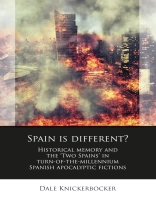The end of the second millennium witnessed an increase in science-fictional apocalyptic narratives globally. There is a noteworthy difference between such fictions from Latin America and the anglophone world and those from Spain, in which scientific explanations of events coexist with biblically-inspired plots, characters and imagery. This is the first book-length study of either science-fictional novels or apocalyptic literature in that country, analysing six such works between 1990 and 2005. Within a theoretical framework that includes critical and genre theories, archetypal criticism, and biblical scholarship, the book explains this phenomenon as a result of three historical factors: the ‘Two Spains’, Spanish ‘difference’, and the ‘Pact of Silence’, a tacit agreement that made justice and accountability impossible in the name of a peaceful transition to democracy. It repressed any processing of the historical trauma experienced during the Civil War and dictatorship, trauma that manifests itself symbolically in these fictions.
Table of Content
Series Editors’ Foreword
Acknowledgements
Chapter 1. Introduction
Chapter 2. Apocalypse and apotheosis in Rosa Montero’s Temblor
Chapter 3. Apocalypse and alienation in Javier Negrete’s Nox perpetua
Chapter 4. The Mater of all apocalypses: Juan Miguel Aguilera’s La locura de Dios
Chapter 5. Enlightening the apocalypse: Enrique del Barco’s Punto Omega
Chapter 6. Born to kill: Eduardo Vaquerizo’s Mentes de noche y hielo
Chapter 7. ‘Fiery the angels rose’: José Miguel Pallarés and Amadeo Garrigós’s Tiempo prestado
Afterword
Works cited
Index
About the author
This collection will be suitable for University undergraduate and post-graduate students who are interested in Spanish literature or science fiction studies.












